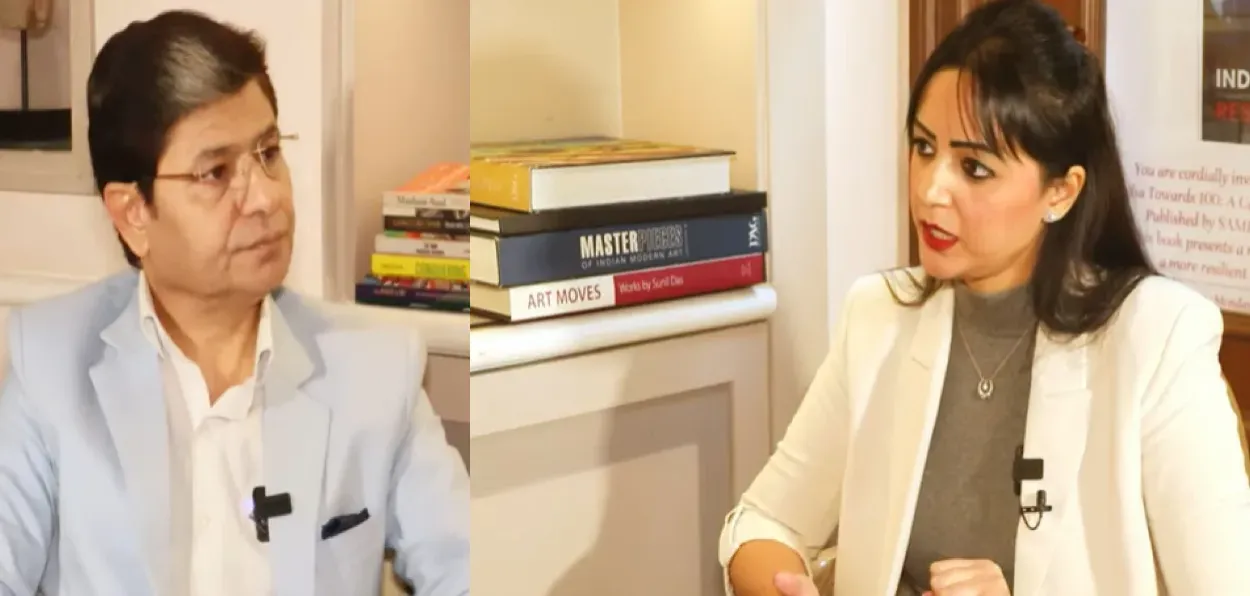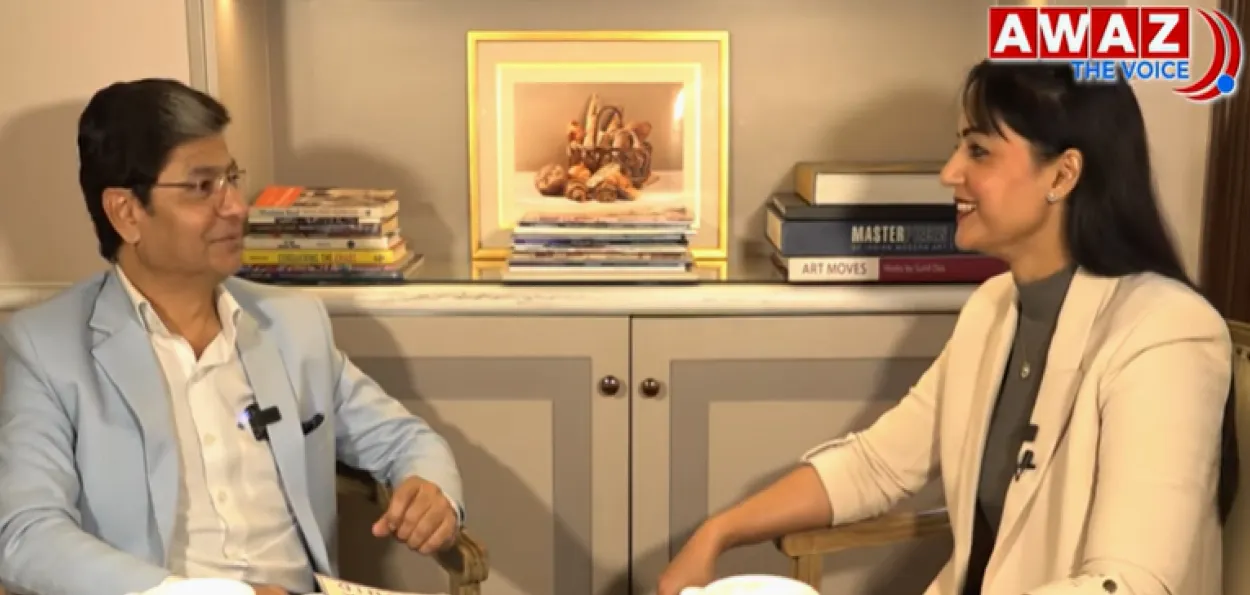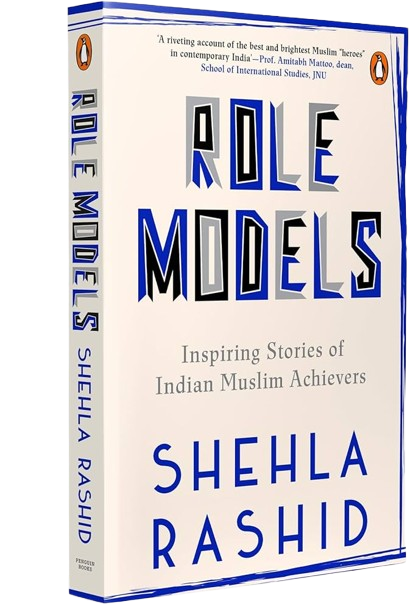
New Delhi
"I think it happens with aging. At one point one focuses on the problem, while at another stage, one feels that finding a solution is a better way. Today, I want to think about the development of the community, wondering why we (Muslims) are lagging even after 75 years of independence." Shehla Rashid, student activist of yesteryears-turned author of Role Models, said this about her changed attitude towards the Narendra Modi government in an interview with Awaz-The Voice Editor-in-Chief Atir Khan.
In a free-wheeling conversation with Awaz-the Voice, Shehla, who belongs to Kashmir, spoke on all issues including politics, Muslims, education, etc.
Shehla Rashid's recently released book Role Models highlights successful Muslim personalities. She said she received immense support from all, including from the most unexpected quarters. “Everyone appreciated this idea. The new generation liked this book,” she said.
 Atir Khan, Editor-in-Chief, Awaz-the Voice in conversation with Shehla Rashid, Author, Role Models
Atir Khan, Editor-in-Chief, Awaz-the Voice in conversation with Shehla Rashid, Author, Role Models
The book is selling like hotcakes; it’s being publicized through word of mouth and people are writing rave reviews of the book.
Replying to a question on Why Muslims have not progressed and remain backward" Shehla Rashid said that Muslims will have to break the mental barriers that “we have set up and secondly, we will have to focus on community development.”
She said family and personal development must be separated from politics. “If you want to vote, keep voting for a party of your choice, but don’t create a messiah out of a party or an individual. It is not right to think that unless a member of the Nehru-Gandhi family becomes the Prime Minister, we will not be able to achieve anything.
“We have to break free of this notion because India is a free country. It is an open society where there are opportunities for everyone. It’s fine to focus on your personal development along with that of your community. We in the family have to look at how we should plan our lives based on our income. Can we afford so many children or not? Can we afford just one or two children? Can we give them basic education? All these things are written in this book.”

Shehla Rashid said she fails to understand why we (Muslims) do not respect and accept our heroes. “We have to respect our heroes, and only then the world will respect us. I want to give you an example. The day Dr. APJ Abdul Kalam died, Yakub Memon (terror convict) also died. It is worth noting that since Dr. Kalam was the President of the Republic, he was laid to rest with full official honours. However, unfortunately, no one from our community came out (to mourn his death). The common people had this notion that Dr Kalam was an idol worshipper. This is unfortunate.”
In response to another question, Shehla Rashid said that one can surely face discrimination in social life. “It happens, you have to face it at different points of life, but this is not the case with the system; nor with the government. This discrimination is not part of the system. An example of this is that if you apply to UPSC or any institution, your selection is transparent. The proof of this is the stories of children of poor families clearing the UPSC and becoming IAS officers each year. If you are writing a book in a media organization, no one will stop you. If you decide today that my child wants to become a top lawyer in India, then his success will depend on his hard work and ability. We do not have any such restrictions that hinder our progress”.
On the misconceptions prevalent among Muslims. Shehla Rashid said she was shocked to know about these while interviewing Lieutenant General Atta Hasnain for her book. “He narrated an incident of a young madrassa student who asked him how he became a General where there are no Muslims in the Indian Army?”
“Even the General was surprised. He asked the child about this impression of the Army, and the extent of the misconception came out. The child believed that drinking alcohol is compulsory while Halal meat is not available in the army.”
She asked the Indian Muslims to look at neighbouring Pakistan’s situation. “There is a blast outside a Shia mosque almost every day. I have tried to say this in my book and in my interviews that India is safe for Muslims because no one here will tell you that if you are Shia, you cannot pray like this, if you are Sunni, you cannot do this, no matter what the sect, everyone is free. The Ahle-Hadith mosque is separate; other sects have their separate mosques and imams. The reality is that India is safe for everyone. Whether you are Ahmadiya, Shia, Aga Khani, or from any sect. You should look at Pakistan, a country created for Muslims. There, Ahmadis can never become prime ministers, they cannot join the army.”
Asked about what she thinks of Majlis-e-Ittehad-ul-Muslimeen leader Asaduddin Owaisi, Shehla said, “I like Owaisi sahib and try to learn a lot from his speeches. I think his speeches in Parliament are very important. I believe that the youth who want to enter national politics should learn from Owaisi sahib. I can also learn a lot from him because Muslim politics is very difficult. The biggest thing is that Muslims do not accept anyone as their leader, but Owaisi sahib, on the contrary, has general acceptance. I like him and everyone likes him. Even Hindus like him because his speeches are very powerful.”
ALSO READ: After 15 months, Israel and Hamas to end fighting, release hostages, prisoners
Regarding some of Owaisi's controversial statements, she says that sometimes the tongue slips, mistakes are made by everyone, and we are all human, I think when he said Jai Palestine in Parliament, he probably forgot to say Jai Hind. It is important to see whether he is getting votes or not. It is not that he is getting votes only from Muslims, he is getting votes from Hindus as well. He is working. He is also a role model.
You can watch the detailed interview on YouTube:
